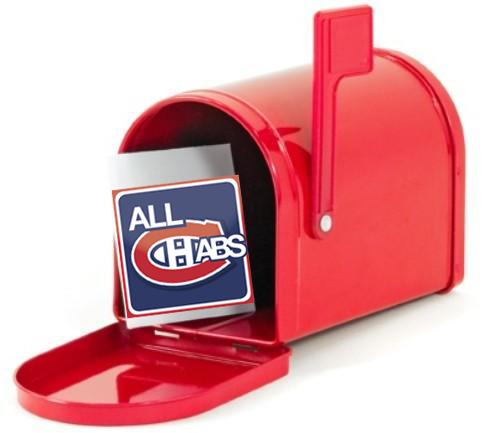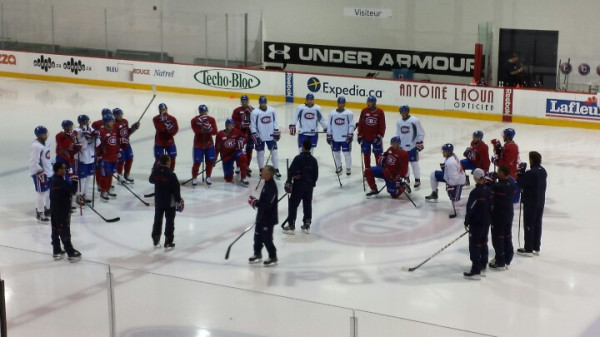By Robert Rice, Senior Writer, All Habs Hockey Magazine
TORONTO, ON — The All Habs Mailbag is as popular as ever! This is the place to send in your questions about all things Montreal Canadiens.

Then check every Thursday to read the answers to the most popular or poignant questions about the Habs. Keep in mind that we will discuss the entire Canadiens organization so questions about prospects and roster players are equally welcome!
Submissions can be mailed directly to [email protected]
Three Guidelines for Submissions:
- This is not for hate mail or complaints. If you have an issue with what you read on these pages, this is not the place to bring it up. The mailbag is for questions about the Montreal Canadiens organization and the NHL.
- As long-time readers of All Habs know, we do not publish rumours. Therefore I will not engage in discussion of the validity of rumours — frankly I consider them a waste of time anyway. For every rumour that was close to accurate, there have been about a thousand duds.
- Nothing of essay-length please. There will be other people who will have questions and it is a bit unfair if I have to dedicate the Mailbag to answering one very large question or someone who’s asking five questions at once.
Herman E
Do you think Habs may have rushed up Alex Galchenyuk?
While Alex Galchenyuk’s production has certainly dropped off from his early-season work, it is important to factor in why. It is notable that Brendan Gallagher continues to be the most productive rookie on Montreal, but his assignment is more favourable skating with David Desharnais and Max Pacioretty. The Desharnais line is the most shielded line, as between them, they have an average of 61.9 percent of their shifts in the offensive zone. Gallagher himself is the most most-favoured forward for the offensive zone, starting 64.8 percent of his shifts there, compared to Galchenyuk’s 55.1 percent starts in the offensive zone. One also should consider assignments, Galchenyuk plays with Lars Eller who is assigned a more defensive role than Desharnais’s line and is often against tougher competition. It is also worth noting the third man on this line has often been more of an offensive sinkhole than one of respectable offensive talent.
The second consideration is the practical development for Galchenyuk. He was clearly too skilled for the OHL by the time he was called up to play for Team USA at the World Junior Championships and was ready for the next level when he reported to Montreal. While Galchenyuk is not dominating the scoresheet, he is not exactly out of place and is often creating offensively. What Galchenyuk will take away from this season is his adaptation to playing against professionals, the speed of the NHL and what it takes to beat an NHL goaltender. Playing against NHL competition is the best way for him to move forward in his development at present and he is not being overwhelmed by the pace, speed or physical nature of the game.
Who at this point would it be best for the Habs to play in the playoffs?
If the NHL Playoffs were to commence tomorrow, the Canadiens opponent would be facing New York Islanders, which would their best opponent to face as well. While there will no doubt be many worried feelings among fans about the losing record the Canadiens have had against the Islanders in their last two regular season series, I believe the strength of the Canadiens roster would weigh the favoured results.
Put simply, the Canadiens have the Islanders beaten in depth at forward and defence while also boasting superior goaltending. The Islanders are notably reliant on the top line of John Tavares, Brad Boyes and Matt Moulson, which would be the natural assignment of the Canadiens leading shutdown man in post-season play, Tomas Plekanec, who has been very effective in matching against elite players in the past. After the Islanders top line, their scoring tends to take a notable drop, which would allow the Canadiens depth lines to give them the edge in scoring in a playoff series. A mix of David Desharnais, Brendan Gallagher, Max Pacioretty, Lars Eller, Alex Galchenyuk and potentially Rene Bourque give them two very talented scoring lines to send after the Islanders. Versus a mix of Frans Nielsen, Michael Grabner, Kyle Okposo, Colin McDonald, Casey Cizikas and Josh Bailey, the Canadiens clearly take the advantage.
In terms of matching the defence, one could argue P.K. Subban by himself lifts the Canadiens over the New York Islanders in terms of talent level, especially buoyed by a top-4 group of Andrei Markov, Josh Gorges and Alexei Emelin. While Mark Streit is a good defencemen and Travis Hamonic is a growing talent for New York, the rest of the Islanders defence in names like Lubomir Visnovsky and Andrew MacDonald do not exactly tip the scales to the Islanders on depth.
In pitching the goaltending battle, Carey Price versus Evgeni Nabokov, there are some numbers to examine. Nabokov is polishing a save percentage of .906 this season, versus Price’s .914. While this doesn’t seem like a major difference and in fact suggests Price is having difficulties between the pipes, the Even Strength Save Percentage numbers tell the real story. Carey Price is enjoying a .928 save percentage at even strength, while Nabokov sits at .911. Given that penalties are much less common in the post-season, the advantage flips to Price, whose .833 save percentage on the PK versus Nabokov’s .876 percentage is an issue. Granted, the Canadiens also need to improve their penalty killing scheme, which has the team mired with their worst penalty killing numbers since 2006. Their ability to prevent scoring chances this year has been poor on the kill, often seeing a man left undefended close to the net as the team experiments with a ‘diamond formation’ that seems to leave the goaltender alone too often and causing too many goals against.
It is difficult to find a reason for Montreal to lose, outside of an otherworldly performance by Tavares and Nabokov so it would be in their interest if the Islanders could stay where they are in the standings.
Marc
Other than Max Pacioretty (who took a discount) can you think of any bridge contracts that didn’t end up costing more long term?
The issue with bridge contracts (and the cost that tends to come later) is that teams are too much wrapped up in the ‘everyone is the same’ policy when they decide on a bridge contract policy.
Hockey is known as, taught, coached and sold as a team sport. But the issue is, all players are not created equal. There are stars and superstars and they are different from their compatriots. Some players define the success of their franchise by themselves, others are just steady, but ultimately replaceable. When it comes to the players that define what their franchise will be, I believe teams should make exceptions. Take the example of P.K. Subban, while for now he is playing at a discount for Montreal, it will not be long before he will be looking to earn Carey Price’s salary on his next deal, if not more if his name ends up on the Norris trophy. Whether Marc Bergevin felt Subban had not proven himself enough or that he wanted to hold to a bridge policy is not quite clear but right now it seems like a long-term investment would have been more prudent. One could look at where Alex Galchenyuk will be at the end of his entry-level deal and consider a long-term investment would be worth it versus a bridge contract that would lead to a much greater expense later.
One does have to consider though the argument that bridge contracts hold young players accountable for a bit longer and force them to earn the big deal. but in my view if a player has been properly analyzed and coached, the risk is not that high and the team making the investment is better off taking a risk on paying now over paying notably more later. However with no certainties in anything and injuries always a possibility it does save a team from committing too early when potential setbacks could seriously sour a player’s potential. Bridge contracts can also give a team some shorter-term cap flexibility to bring in extra talent during a Cup Contending window and then pay their young talent later, when they themselves are enough to bridge the talent gap for a potential Cup team.
Steve R
Why bring so many younger players into Hamilton with only a few games left, and waste a year of their contract?
There is not really an issue as the majority of the incoming players have not actually signed their Entry-Level Contracts. Prospects assigned to Hamilton such as Olivier Archambault, Charles Hudon, Brady Vail and potentially Sebastian Collberg, these prospects have signed Try-Out Contracts to get some professional experience before going back to their original teams where they already hold commitments for the 2013-14 season. The only exempt name from that list is Olivier Archambault who is probably playing for his professional contract as he’s been the most underwhelming of the team’s junior prospects and needs to impress the team a little to possibly earn his pro deal.
In the case of Danny Kristo signing his entry-level deal, I believe this was a safety measure against the team losing scorers in the final stretch of the season and having Kristo available. As he is arguably the organization’s most gifted offensive prospect that has not played pro hockey yet, I believe it is a wise measure to have him available if injuries strike and scoring talent is needed. While it may seem a bit of a risk to burn a year off of Kristo’s contract, the flipside of it is that he doesn’t have much leverage when his up for a new contract as he would d have a very short body of work to make a case for big money on any new deal.
Moose B
Based on Marc Bergevin’s inactivity at the trade deadline what do you see as his plans moving forward (draft and free agency) ?
I believe Marc Bergevin is planning to keep moving along with the philosophy he came in with, he will allow the Canadiens’ scouting staff to continue with their work and build the team from the inside. How the draft will turn may depend on the opinions of the scouting group as they may ask Bergevin to make a move up in the draft if they feel there is a player they must add to the team by swapping picks for a higher selection.
As per free agency, it is hard to imagine a dramatic move. I think given Michael Ryder’s solid work, he may very well earn a contract extension with Montreal and that will more or less be Montreal’s most notable move. There is of course the chance they take a run at a player like Nathan Horton or David Clarkson to bring a more physical scoring element to the lineup, but they may just as likely be held on to by their own teams. I would expect extensions for Ryan White and Peter Budaj, but I believe Bergevin will maintain some flexibility in the forward lineup to allow more prospects to move up. Bergevin has shown no issue with skating rookies this season and will likely continue to leave room for young players to make the team.
FC
With the number of compliance buyouts sure to swell free agency ranks this summer, who do you think Marc Bergevin will try to target?
I do not believe there is a player that will be the target of a buyout this summer that will be of much interest to Montreal. As Montreal has already bought out Scott Gomez and their likely next target is Tomas Kaberle, it is easy to observe the targets of these compliance buyouts are players that just are not worth their money or have declined very badly from their best days. While likely these players will be looking to sign cheap deals to try and gain redemption, Montreal’s own roster depth looks to more than cover them for the 2013-14 season without possibly adding a player whose career is on the ropes.








![Prospect Report: Habs Development Camp Testing [GALLERY]](https://habshockeyreport.com/wp-content/uploads/2014/07/IMG_2897.jpg)

![Habs Western Road Trip in Pictures [GALLERY]](https://habshockeyreport.com/wp-content/uploads/2014/03/476898185_slide.jpg)